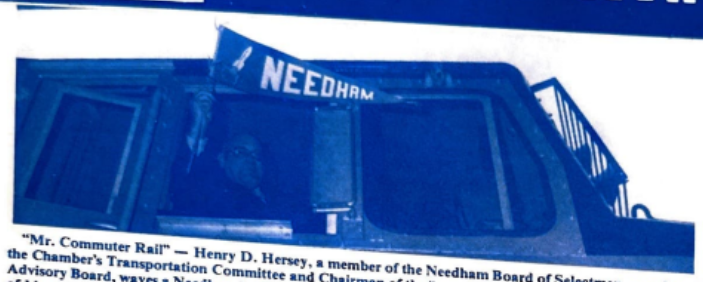Did We Get it Wrong on the Orange Line?

Did We Get it Wrong on the Orange Line?
July 29, 2025
Good morning,
Max Woolf here — I’ll be delivering the chamber’s newsletter this week.
A quick reminder that as the chamber’s Public Policy and Government Affairs Manager, I help our members navigate local, state, and regional government.
If your business or nonprofit is facing a challenge involving your town, city, or the state, don’t hesitate to reach out.
Did we get it wrong on the Orange Line?
This year is the chamber’s 110th anniversary, in celebration we’ll be periodically digging into the chamber archives to reflect on our 110 years of advocacy.
A couple of weeks ago, Greg shared that in 1921, the first chamber director made the same argument that we do today: that housing availability in our communities is squeezing out our workforce.
However, not all of our advocacy has been so consistent.
In 1979, when the state considered extending the Orange Line to Needham Heights, effectively replacing the commuter rail, the chamber opposed the plan. At the time, we cited “the huge, gross costs of the project and building a parking garage at Route 128.” Local opposition, combined with the chamber’s advocacy, ultimately helped derail the proposal.
While the chamber celebrated that accomplishment at the time, today, we’re not so sure.
Bringing rapid transit to Needham is precisely what our businesses need to spur investment and bring workers and customers to our local shops. Let us know what you think?
While this issue may seem settled, the future of the Needham Line remains uncertain. Growing capacity issues on the commuter rail system have reignited calls to replace the Needham Line with an alternative service.
Let us know if you think our former selves got it wrong as well?

Pictured is Henry D Hersey riding the Commuter Rail. A member of the Needham Board of Selectmen,
Hersey saved the Needham Line by advocating against the Orange Line expansion. Hersey Station in
Needham is named after him.
Revisiting the numbers in Wellesley
Last week, Greg reported on the historic effort to collect and map zoning rules nationwide, a project called the National Zoning Atlas. Its goal is to consolidate the often-incomprehensible patchwork of local zoning regulations and show where housing can be built by-right.
This gave us an opportunity to compare how much land in our chamber communities is zoned for apartment buildings, defined as developments with four or more units.
But one number caught our attention: Wellesley’s initial map showed that 12% of the town’s land was zoned for multifamily housing. That would make Wellesley one of the most permissive suburbs in the state, on par with cities like Medford or Revere, and well ahead of Newton’s 6%. It didn’t quite add up.”
We reached out to the nonprofit behind the map for clarification. They quickly agreed the figure was incorrect and have since published new, corrected data, showing that four-plus unit buildings are allowed by-right on 7% of Wellesley’s residential land, while single-family homes are allowed across more than 99%.
So, the map got it wrong, but maybe it also got it right…
Funnily enough, the original incorrect map — which allowed for gentle density around Wellesley’s three commuter rail stations — is the kind of zoning that the MBTA Communities Act was meant to deliver to suburbs: modest, walkable housing growth near transit.
But in Wellesley, as in many other communities, that vision was not realized.
Gen Z wants to be in office
A new Gallup poll finds that Gen Z workers are the least likely generation to prefer fully remote work.
Only 17% of respondents say they want to work entirely from home, compared to 34% of baby boomers and 27% of Gen X.
Though it may seem surprising for a generation raised online, Gallup points to another trend: Gen Z is also the loneliest generation. Many entered the workforce during the pandemic and may be seeking the connection, mentorship, and structure that in-person work offers.
While fewer parenting responsibilities may also play a role in the rejection of remote work, the poll also finds that Gen Z is the most likely to say they wish their colleagues worked remotely less often.
By contrast, older workers, more established in their careers, tend to value the flexibility and autonomy of remote work.
Read the complete study here.
Remembering Captain Marden
 |
We’re saddened to share the passing of Keith Marden Sr, founder of Wellesley staple Captain Marden’s Seafood. He was 102.
After returning from service in WWII, Marden joined his brother Edgar and their father in expanding the family business from its West Newton location to Wellesley, where Captain Marden’s has been a fixture since 1945.
In addition to building a beloved local restaurant and fish market, “The Captain,” as he was referred to, was deeply involved in civic life, including service as Wellesley’s town assessor and a remarkable 41-year tenure as a director at Wellesley Bank.
“He touched the lives of so many during his 102 years of life, whether it was in the fish market, restaurant, around town, or on the golf course,” his family shared.
Tuesday grab bag
- Over the weekend, the controversy over the removal of the Italian flag colors from the median on Adams Street in Nonantum caught the attention of the New York Times (gift link).
- Over in Waltham, a group of housing advocates delivered their most “effective three hours of local testimony they have ever done” according to their director. Their remarks halted a proposal to reclassify roommate housing as “lodging houses,” a change that could have displaced dozens of renters and forced the board to delay its vote until Sept. 9.
- Join us next Wednesday to celebrate the Needham Business community at our annual Needham Night BBQ. Enjoy a night of casual networking, dinner, and drinks overlooking Kendrick Pond at Cutler Park. Register here.
- MassArt is seeking nominations for the 2025 Common Good Awards, recognizing individuals or organizations working at the intersection of art and civic life; the event will take place on Dec. 6, and nominations are due by Aug. 1.
- MassBay Community College has been named a National Center of Academic Excellence in Cyber Defense—the first community college in Massachusetts to earn the federal designation, recognizing its leadership in training the next generation of cybersecurity professionals and strengthening the state’s workforce and national security.
- Register now to golf, sponsor, or volunteer at Watertown Boys & Girls Club’s 48th Annual Stephen P. Mugar Golf Tournament, Aug. 11 at Oakley Country Club.
- Watertown’s Fifth Annual Arts Market is on Sat., Aug. 9, from noon to 5 p.m. at Arsenal Park in Watertown. Join the hundreds of artists, sponsors, and volunteers already participating. Details.
- If there’s anyone you think could benefit from chamber membership, please invite them to join you at an upcoming event, or sign up for this newsletter. Better yet, fill out this form, and when they join, we'll thank you with a $25 gift card to the restaurant member of your choice for each new member you've sent us.
- This year, NewTV partnered with the Massachusetts League of Women Voters to produce a three-part television series, What Democracy Means in Everyday Life. Watch the final installment, focusing on civic engagement and technology, which aired last week.
Want to go green? Better hurry—Washington’s losing interest
With the passage of the Big Beautiful Bill, several key federal tax credits meant to help businesses adopt clean energy are scheduled to end much sooner than initially planned.
If your business or property is considering upgrades—such as adding EVs to your fleet, installing solar panels, or renovating facilities for energy efficiency—you will have to act fast before these incentives expire. Check out just some of the deadlines below.
- EV Fleet Purchases: Tax credit for businesses buying or leasing commercial EVs ends Sept. 30, 2025.
- Energy-Efficient Building Upgrades: Deductions for lighting, HVAC, insulation, controls, and EV Charger installation expire June 30, 2026.
- Commercial Rooftop Solar: 30% federal tax credit for the installation must be claimed by Dec. 31, 2027.
Newton Mayor Ruthanne Fuller highlights related residential deadlines here (Page 4).
Reminder: These changes do not preclude you from using state subsidies through MassSave. However, soon, you will not be able to use federal funds to make your businesses more green or energy efficient.
And that’s what you need to know for today, unless you need to know that sweating corn is partially to blame for our current hot weather.
Public Policy and Government Affairs Manager
Charles River Regional Chamber
617-431-6101
I also value your feedback
